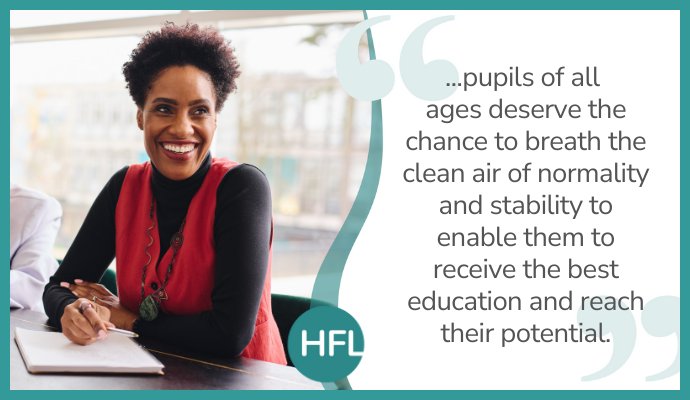
There is little doubt that the lingering impact of the pandemic, coupled with new and emerging challenges are hampering school’s desire to move on and reset the dial on some form of normality. Schools and governors have reacted with tremendous poise and resolve as the full rigour of tests, exams and Ofsted inspections have returned in the past year. Despite this school budgets are a continuous challenge with spiralling energy costs and the wider impact of high inflation, pupil performance is being impacted by a perfect storm of attendance and wellbeing challenges, the disadvantage gap is remaining stubbornly resilient to the best efforts of our amazing schools and now the disruption of strike action will acerbate all of the above and more. Let’s look at some of these and other areas to be aware of in the coming months.
Attendance
Attendance is now a rigorous focus for the DfE and Ofsted. As governors we need to be challenging the data we receive termly from our Senior Leaders and dig deep into what lies behind it. Persistent Absenteeism (PA) is an area of particular concern often impacting on our disadvantaged pupils and yet it’s reporting can often be ‘lost’ in the wider reporting of attendance data. As a board you need to be asking what actions the school is taking to reduce PA, it often focuses on a few individuals and can have a disproportionate impact on overall attendance. How is the school office, often the frontline in improving attendance, being tasked with the daily tasks of recording reasons for non-attendance and equally encouraging and chasing up those families who with a little extra support will understand better the need to have their children attend regularly? How is the data being used to improve attendance? Does the school have a wider plan to improve attendance? With overall attendance data how do you compare to similar schools? Which cohorts or particular pupil groups have the poorest attendance and what’s been done to address this? In many schools there is a changing attitude from parents to attendance that is becoming more embedded whether it be taking advantage of cheaper holidays in term time, taking a more protective approach to illness in light of the pandemic and being more aware of the mental health and wellbeing impact on both the child and family. School leaders and boards need to work with sensitivity to rebuild resilience whilst being sensitive to the wider narrative and influences that feed into this and how it can be combated.
Complaints
Complaints are becoming an all too familiar part of school life often driven by wider societal problems where the frustration and anger caused finds a lightning rod in your school. Equally the day to day pressures on all involved in school life leads to misunderstandings that ultimately manifest themselves into complaints. First and foremost, how are complaints being dealt with? Not responding in a timely fashion and not following due process can often lead to a missed opportunity in resolving it at an early stage. Do governors and school leaders know their complaints policy inside out? Not following your policy, but rather a course of action that may feel right but runs counter to your policy, causes untold damage to stakeholder confidence in the process. A run of complaints can have a significant impact on the wellbeing of Headteachers who in most cases have to respond to complaints and also when those complaints are levelled at the Headteacher. As governors you need to not only be mindful of the level of complaints, but also if there are trends which can be identified and mitigations put in place, usually achieved simply with alterations to policy or practice. Equally being mindful of the impact of complaints on those they are made against and the boards workload in dealing with them.
Strike action
Leaving aside the arguments for and against, this action will leave most schools and boards with a host of HR and compliance challenges and in some cases having to partially open or close the school on strike days. Supporting Heads as they navigate the complexities of strike law and HR advice and ensuring as best possible that the right decisions are taken will be key to ensuring your school copes on the days of action and returns to normal as rapidly as possible after. A positive impact of the pandemic, namely the development by all schools of remote learning, may go some way to mitigate the lost learning where it’s not possible to staff schools as normal. Boards will want to know amongst others what leaders have planned for in terms of remote learning provision, how vulnerable and disadvantaged pupils will be supported either at school or home and how the provision of free school meals will be delivered on strike days. There is definitely no one size fits all response to this, just ensure you pay due regard to DfE guidance, of which there is much to digest, and ensure a plan is in place! The HR team at HFL Education delivered a briefing on best practice and the video is available to view on Modern Governor under the Video Learning tab Modern Governor updates.
White paper
Given the fanfare with which this was delivered timing is everything and with all that has occurred in the world of politics it was one of the many casualties. The new Education Secretary (Gillian Keegan) explained ‘that parts of the government’s plan did not require legislation and were already being implemented’ (read more on this here).One thing that is fairly clear, despite the axing of the white paper, is the direction of travel is still towards academisation and that whatever actions you were undertaking as a board can continue. Whether it be the setting up of a working party, inviting MATs to present to your board or visiting academies then consideration should be given to continuing this work. There may not be the explicit deadline of 2030 for joining or planning to join a MAT but given that the majority of pupils in England and Wales are now taught in academies, a tipping point that was reached some time ago, then the expectation that underlies DfE thinking suggest that there’s no turning the tide on this.
Board diversity
The quest continues to ensure that boards to continue to improve their diversity and in particular to ensure they are more reflective of the community they serve. A heart-warming article hit the press early January that should be an inspiration to us all – ‘Expelled at 12 and Chair of Governors at 26’ is the tale of how one person didn’t let her first encounter with governors at an Exclusions panel put her off wanting to give back to her community and become a school governor. She discusses the all too familiar tale of imposter syndrome that can have such a corrosive effect especially on newly appointed governors and trustees – as a board how are you ensuring newly appointed governors have a planned induction, possibly a mentor and more importantly are reassured their input will be welcome and valued and ensuring this is the case in reality.
So as this half-term ends take some time to have a break from governance before returning for the remainder of the spring term. I constantly remind myself that governance should at the very least be rewarding and occasionally enjoyable, if it’s neither of these then do take some time to discuss this with your Chair, Headteacher or trusted colleague – the old adage of a problem shared still runs true, no one wants governors to be struggling with the voluntary workload they have taken on. Remember there’s also a multitude of support to help you develop in your role as a governor whether it be local or national governance support together with the DfE whose latest Governance update can be found here. For now celebrate the positives and support with the challenges in your schools and know that the work you do is quietly appreciated. Behind the scenes you make the world of difference to your schools.
The HFL Governance team stand ready to support you whether it be through our acclaimed training programme, our supportive Clerking and Chairs service or our fantastic helpdesk.
To contact us please use the following:
Governance helpdesk – 01438 544487
Governance training – 01438 544478
Governance clerking – 01438 544487
Or email us at governance@hfleducation.org



